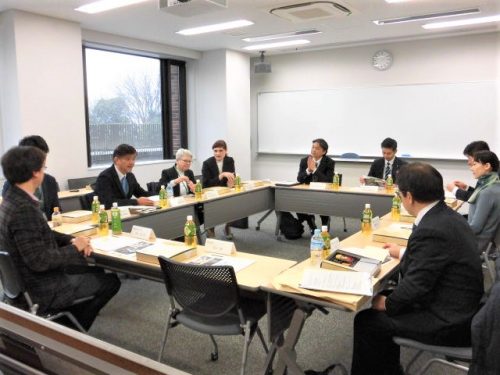Date: 28 February 2019
Venue: University of Tsukuba, Tokyo Campus
Participating organizations: Pacific National University (Russia), Nagaoka University of Technology, Otaru University of Commerce, Japan External Trade Organization (JETRO), Department of Construction, Hokkaido, Civil Engineering Research Institute for Cold Region (CERI), recruitment company Man to Man, TTT Abroad Academy, Hokkaido University (facilitator).
Summary: The participants exchanged information on their respective undertakings, and discussed possible courses of development of Japan-Russia economic cooperation, people-to-people exchange and human resource development. The main points may be summarized as follows.
1. Academic collaboration between Japanese and Russian universities, as a rule, springs from research collaboration based on personal ties and subsequently develops into joint education projects. In the case of Hokkaido and Niigata, similarities of cold regions were behind their collaboration with Russia in the area of urban development.
2. Apart from universities, such organizations as the Civil Engineering Research Institute for Cold Region (CERI), which is under the jurisdiction of the Ministry of Land, Infrastructure, Transport and Tourism (MLIT), and the Bureau of Housing, Construction Department, Hokkaido, are directing their attention to the Russian Far East, and have been inviting Russian researchers and sending their own specialists to academic events in Russia.
3. For the fulfillment of the potential of the highly skilled specialists raised as a result of implementing Japan-Russia academic collaboration projects efforts directed at companies as their future employers are required, starting from information exchange and seminars on the merits of employing foreign specialists. Apart from the expanding direct collaboration between Japanese and Russian companies, the public-private partnerships such as the 2018 International Student Internship Project of the Aichi Prefectural Government is worth mentioning. Internship as an instrument of promoting the recruitment of forein specialists has attracted attention in recent years, and the increasing number of universities are incorporating internship in their curricula.
4. A concerted effort on the part of industry, academia and government is required for attracting more international students to Japan. The importance of widening the appeal of local attractions such as tourist sites or local cuisine is also increasing.
5. The future task is to foster employment environment for foreign specialists at medium and small enterprises by means of implementing projects aimed at matching international students and companies as their internship placements with the aid of recruitment companies. In addition, the tasks crucial for ensuring the lasting employment of foreign specialists also need to be addressed. For instance, provision of accommodation or favourable living conditions, which will have to be dealt with at the administrative level in the years to come.

